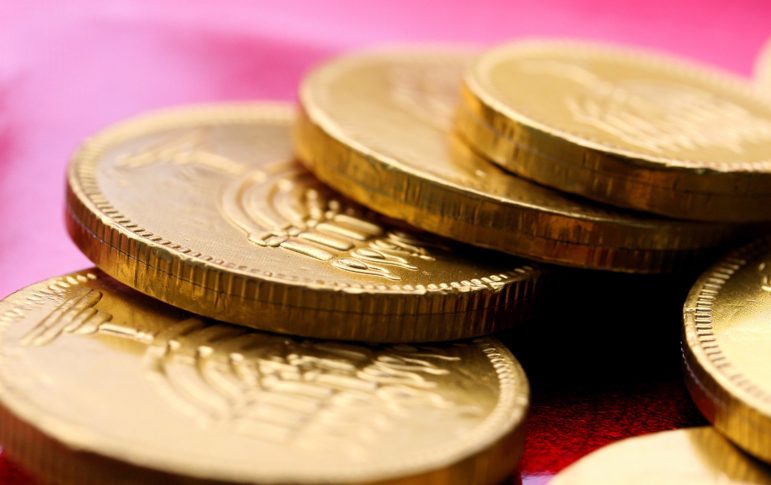By MICHAEL DAVIDOW, Radio Free New Hampshire
Chanukah comes early this year — at least compared to Christmas, its unlikely twin on the winter calendar. It starts on December 10. We will light candles, we will spin tops, we will eat potato pancakes, and we will consider eating chocolate coins as well, even though most brands of Chanukah chocolate taste like wax.

It’s an odd holiday to become so well-known in the wider world. It’s the most martial, most plainly historical, and perhaps the most misunderstood of our Jewish celebrations; famous more for the fairy tale of a small amount of oil lasting for eight days, than for the actual bloody warfare giving rise to that mythical episode.
Our story, then: Alexander conquered the East, and thereby came to control the province of Judea, a self-governing outpost of the mighty Persian empire. Alexander was well-liked by the Jews. As a mark of our affection for him, his name even became an accepted one for our sons. But when he died, and his own empire was divided among his generals, Judea fell under the control of the Seleucid dynasty, based in Syria.
The Seleucids lost their touch when it came to Judea. They attracted the rich, but not the poor. Their leaders desecrated the Temple in Jerusalem. A rebellion followed, led by a group of zealots called the Maccabees. Against all odds, that rebellion succeeded; those zealots recaptured Jerusalem; they re-dedicated the Temple (the oil required for that ceremony allegedly lasted for those notorious eight days); and they gave Judea an independent kingdom again.
Hence those chocolate coins. They celebrate the idea of sovereignty (independent nations mint their own money). And the fact that most Chanukah chocolate tastes like wax is fitting too, because that new Kingdom of Judea, ruled by a bunch of zealots, proved not only politically weak, but spiritually weak too.
Remember: the Maccabees had been poor. They had represented the countryside, in a society dominated by city people. Yet when they came to power, they changed their ways. Living in a world defined by Greek political power, Judea’s new rulers succumbed to those same influences. They turned soft. They turned self-serving. The rabbis who eventually wrote their history disliked that line of kings. They lacked the moral authority which the rabbis so greatly valued.
Judaism must always be understood as having been a state religion. If you lived in Jewish lands, you followed Jewish law; that is what made you a Jew. But imagine, if a thousand years from now, people believe there had once been a religion called Americanism. What would those future historians think?
Did we follow California laws, or Florida laws? Were we liberal or conservative? Were Democrats and Republicans both Americanists, or did they somehow follow separate belief systems?
Judaism is no different. The society which gave rise to what we now call the Jewish religion was no less complicated, no less subtle than our own. It had political parties, whose differences were expressed in both legal and religious terms. It had urban and rural; it had money and it had poverty; it had progressives and it had traditionalists. The history of the Jewish religion represents an endless struggle between the many different sectors of the Jewish body politic.
Interestingly, once that little kingdom founded by the Maccabees fell for good, and once the Romans finally destroyed the last vestiges of an independent Jewish state, salting the ground so thoroughly after one too many rebellions, that they even wiped the name “Judea” off their maps, naming that wayward territory of theirs after the ancient enemy of its natives instead (the Philistines; hence the word “Palestine,” an invention of ancient anti-semites with a giant political ax to grind), the rabbis who did the most to sort out the boundaries of the Jewish faith, who kept it intact even without the Temple, even without Jerusalem, even without a land of its own, were the rabbis who lived in Babylon, under a succession of Eastern rulers.
Jews had lived in Babylon, after all, since the original fall of Jerusalem, centuries before the Maccabean revolt. In fact, they had lived in Babylon while the Maccabean revolt was happening. In fact, their rulers at the time were those same Seleucid Greeks being attacked by the Maccabees. The Jews of Babylon actually got along with the Seleucids pretty well. This was an empire, after all. Successful empires tend to give the local authorities a fair amount of leeway. It is likely that Jews even served in the Seleucid army.
But we have never chosen to celebrate that fact.
Chanukah: it’s political. Plus, chocolate coins.
Michael Davidow is a lawyer in Nashua. He is the author of Gate City, Split Thirty, and The Rocketdyne Commission, three novels about politics and advertising which, taken together, form The Henry Bell Project. His most recent one is The Book of Order. They are available on Amazon.
InDepthNH.org takes no position on politics. The opinions in columns and op-eds pieces belong to the author.






